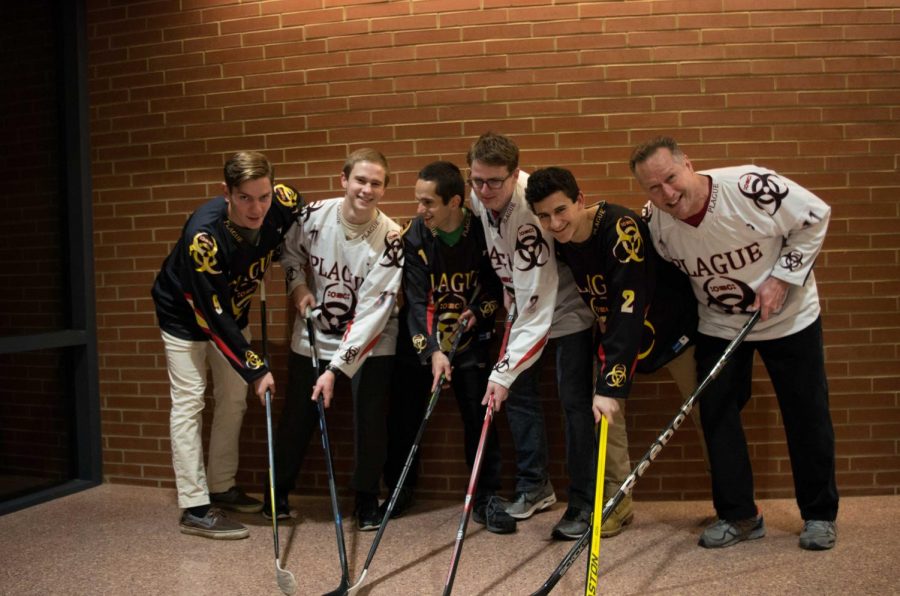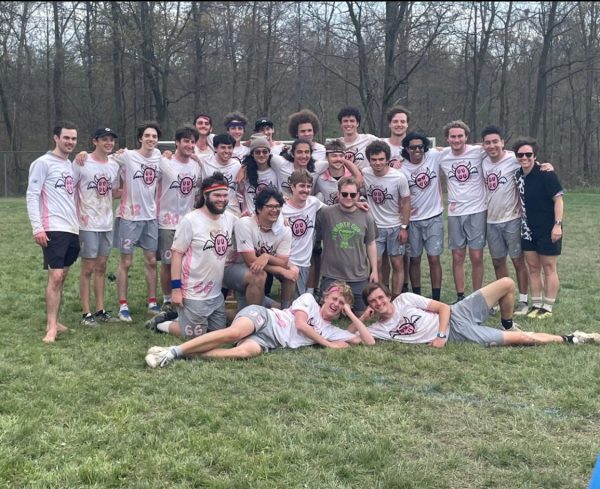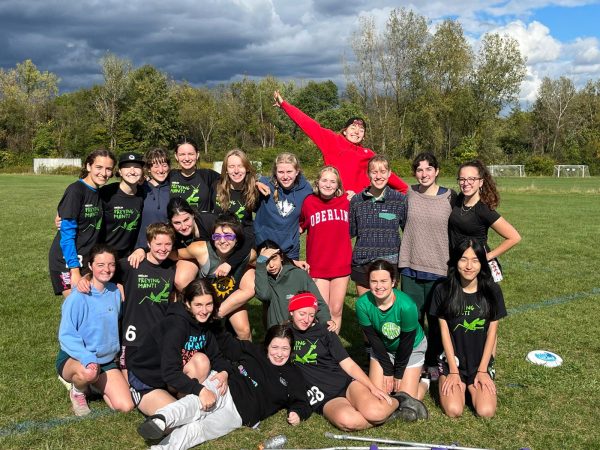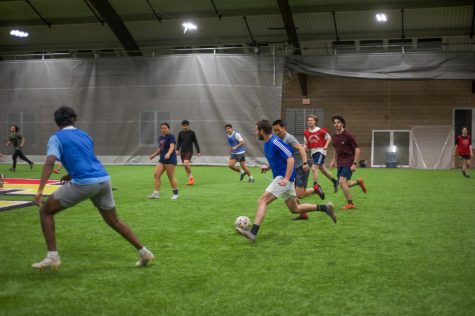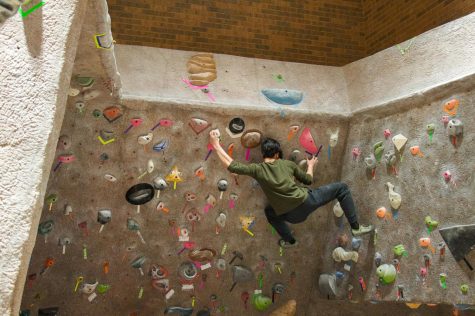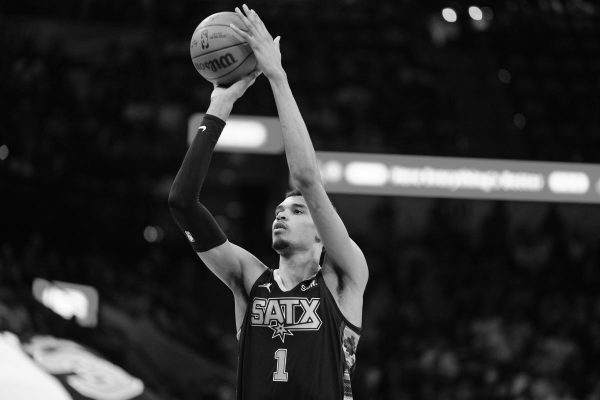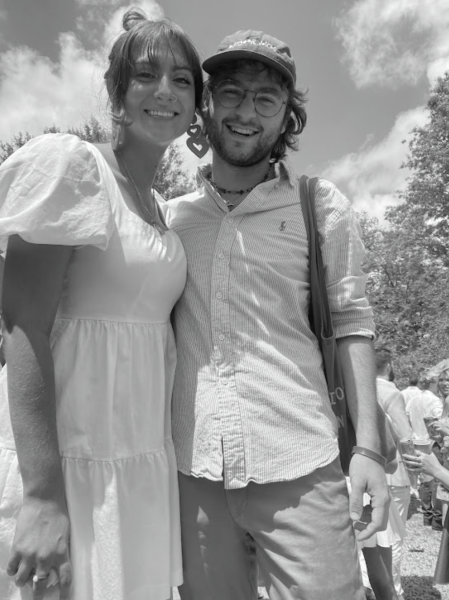Club Hockey Skates Again
Photo by Hugh Newcomb, Photo Editor
From left to right: First-year Nick Dawkins, first-year Daniel Hill, junior Ethan Hill, senior Ken Allen, junior Jake Parentis, and Cortland Hill, OC ’77.
The Plague, Oberlin’s club hockey team, will play its second and final game this semester against The Chiefs, a team of Hockey North America, a recreational no-checking hockey league, tomorrow. While school funding is low and games are few and far between, the 18 members of The Plague represent a rich culture of hockey at Oberlin that has existed for more than 50 years.
Chemistry and Biochemistry Instructor and Lab Manager Cortland Hill, OC ’77, who joined the team after returning to Oberlin in 2000, played for the Yeomens varsity hockey team as a student and has seen Oberlin’s hockey program mature for much of the last 40 years. Although Oberlin has not had a varsity hockey team since 1978, The Plague still manages to build a close-knit community and a competitive team.
“We get people from all classes joining the team,” Hill said. “It’s a wide range of people we have. Some are athletes, some are not. One of the nice things about the team when we get into games, is that we end up playing against people in the surrounding community. It gives the students a chance to see what people from the surrounding communities are like.”
The co-ed club sport usually plays three games in the fall and four games — including two alumni games — in the spring, but had to cancel one game this semester because the Elyria rinks were not ready. In the past, The Plague played other schools’ club programs and would check their opponents in game. However, eight years ago when several players got serious injuries, the college decided to only play non-checking. After several universities, including The Ohio State University, voiced their dismay, The Plague began playing HNA teams, which are comprised of community members who are usually in their late 20s and early 30s.
The Plague will get their chance at revenge tomorrow in their game against The Chiefs, whom the lost to last weekend by a final score of 12–5. The Plague quickly fell down five goals, and although they started to find a rhythm, it was too little, too late. The young team, which has five new players, fields both players who have been skating their whole lives and players who have never played before but heard about it because they are in Hill’s lab section. Nevertheless, they have built a supportive environment that first-year student Daniel Hill, Cortland’s son, has watched develop since he was 12 years old and played in alumni games.
“I started before I was in high school because my dad is the faculty advisor,” Hill said. “It’s been fun to see every year different people come out just to see the varying skill levels. Some years you’ll have people who’ve played their whole lives and some years you’ll have people who’ve never played before. Just to see the team come together [every year] despite these differences has always been really fun.”
For the past 13 years, alumni games — in which players for both The Plague and the former varsity team compete against each other — have been highlights of the season. Members of the 1964–1965 team not only show up to play, but dive down onto the ice to block shots. The alumni games are opportunities for the players to show their appreciation for the game and the camaraderie that The Plague maintains.
Junior and club President Jake Parentis, who manages the team’s activities on top of participating on the varsity lacrosse team, has never thought that being on The Plague was too much work.
“It’s definitely not a chore,” Parentis said. “I do it for the love of the game. I love playing with all of my friends on the team. It’s a great workout for me for lacrosse, and we all really enjoy it and have a good time.”
A testament to the players’ passion for The Plague are their battles with Oberlin College itself, as well as the HNA. Several years ago, former Delta Lodge Director of Athletics Vin Lananna called Hill and said that he did not like The Plague’s name, and that if they did not change it to the Yeomen, he would cut the club’s funding. Unfazed, Hill challenged Lananna to cut it; at the time, The Plague received only $50 annually from the college. Some coaches have also voiced concern about the team through the years, encouraging their players not to play the recreational sport in the off-season for fear of injury. Back when hockey had a much larger presence at Oberlin, there was even a rink on campus next to where the Austin E. Knowlton Athletic Complex now stands. However, the cost of maintaining the rink became too big for the Athletic Department at the time, leading to the rink’s closure. Despite the uphill battles, The Plague has not just survived, but has become a team that allows students to compete and express themselves.
Laurence Ducker, OC ’13, who was a near-Olympic level speed-skater, came to Oberlin after spending a gap year in Colorado training for the 2010 Olympics. However, when he competed in the Olympic tryouts the following January, he fell just short of his top-10 goals with a 14th place finish. When he arrived at Oberlin he heard about The Plague from Hill. When he arrived at the first practice, he was the fastest player on the ice, but could only turn in one direction and would circle the rink again and again. With a little training, he not only learned how to turn, but enjoyed a lengthy club hockey career, and found closure on the ice after not competing in the Olympics.
As this semester winds down, Hill, who was just joined by his other son, junior Ethan Hill, is sure to not only recruit more, but get his team in shape for the alumni games to come. After 53 years of hockey-playing, The Plague continues to offer an experience like no other on campus.
“We’re always looking for players, regardless of ability,” Hill said. “The beautiful thing about Oberlin is you can play a sport regardless of where you are. I’m really encouraged about our prospects right now. … The problem is, our profile’s very low on college [consciousness] and a lot of people don’t know we exist. The importance is to get the word out and let people know that we exist, that we’re active. Then we’ll try to get them on the team.”


